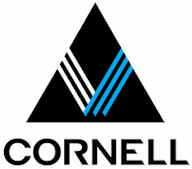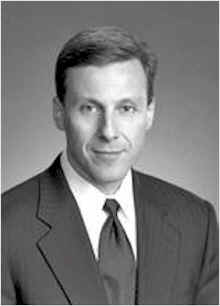CEOCFO-Members Login
Become A Member!
|
This is a printer friendly page!
Dispelling The Skeptics, Cornell Companies Management Has Been
Able To Restructure The Company To Compete, Execute, And Translate Their Strong Operation
Into Business Success

Services
Security & Protection Services
(CRN-NYSE)
Cornell Companies, Inc.
1700 West Loop South, Suite 1500
Houston, TX 77027
Phone: 713-623-0790

James E. Hyman
Chairman, President and CEO
Interview conducted by:
Lynn Fosse, Senior Editor
CEOCFOinterviews.com
Published - September 28, 2007
BIO:
James E. Hyman
Chairman, President and CEO
Mr. Hyman is Chairman, Chief Executive Officer and President of Cornell Companies, Inc.
and brings more than 20 years experience in business leadership having had
responsibilities for finance, operations, mergers and acquisitions, and restructuring
businesses across multiple industries.
Prior to joining Cornell, Mr. Hyman was Senior Managing Director at FTI Palladium
Partners, an interim management firm. He was also a partner with Sandhurst Capital, a
merchant bank focused on the financing and restructuring needs of small cap companies.
Before Sandhurst, Mr. Hyman was Executive Vice President at Starwood Hotels & Resorts
Worldwide, where his responsibilities included the design and implementation of Six Sigma
globally, as well as supervising Starwood's timeshare business, its design and
construction activities and Strategic Sourcing.
Previous to his work with Starwood, Mr. Hyman was President of a General Electric
subsidiary in Europe and led business development for all of GE Capital's equipment
management businesses globally. Mr. Hyman joined GE Capital from Sequa Corporation, an
industrial conglomerate, where he led corporate development. He spent seven years with
McKinsey & Company leading engagements for industrial and aerospace clients. Mr. Hyman
started his career at JPMorgan, where he was an Assistant Treasurer in New York and
London.
Mr. Hyman received an MBA with Distinction from the Harvard Business School and an AB with
honors from the University of Chicago. He is married with three children.
Company Profile:
Cornell Companies,
Inc. is a leading private provider of corrections, treatment and educational services
outsourced by federal, state and local governmental agencies. Cornell provides a
diversified portfolio of services for adults and juveniles, including incarceration and
detention, transition from incarceration, drug and alcohol treatment programs, behavioral
rehabilitation and treatment, and grades 3-12 alternative education in an environment of
dignity and respect, emphasizing community safety and rehabilitation in support of public
policy. At August 31, 2007, Cornell had 75 facilities in 15 states and the District of
Columbia with a total service capacity of 17,452.
CEOCFO: What was your vision when you became CEO of
Cornell Companies?
Mr. Hyman: “The vision was that this was a
company that had very strong operations, but had been unable to translate that into
business success and as a result we were lagging our industry and the expectations of
shareholders. My vision was to restructure the company to perform at a higher level.”
CEOCFO: How has that vision
developed for you?
Mr. Hyman: “Good, our stock is up, our
performance is strong across the board. We had dispelled much of the skepticism by
external parties by our ability to compete and to execute.”
CEOCFO: What does Cornell know
that other companies do not?
Mr. Hyman: “I do not think there is anything in
particular that we do that is unique. We run good programs; we focus our assets on the
facilities, our adult and juvenile facilities where we know how to deliver value to the
client and operate well. We have eliminated the programs where we do not think we add much
value and do not contribute to our portfolio.”
CEOCFO: Is there a geographic
concentration for you?
Mr. Hyman: “Today we have three business
segments. We operate adult secure facilities, we operate juvenile programs and we deliver
community correction urban solutions. Our geographic spread today is across the United
States from the east coast to Alaska and down to the Mexican border of Texas. We are not
looking for geographic expansion, what we are looking for is expanding our footprint and
expanding the depth of business that we do with our existing customers.”
CEOCFO: Would that be opening
new facilities or taking over the running of already existing facilities, how do you grow?
Mr. Hyman: “We grow by expanding our existing
footprint. Because much of new growth is an RFP [request for proposal] process, we will
selectively compete on RFPs and use that to establish a new footprint in a particular
area. Then what we do with the existing footprint and that new one would be to expand that
over time. Much of the growth of our company comes from expanding our existing facilities
or changing the mix of our existing facilities to customers or clients that are more
economically viable.”
CEOCFO: Is there a trend toward
more outsourcing in the industry you are in?
Mr. Hyman: “Customers, who currently outsource,
are experiencing strong growth. However, we do not predicate our plans on those who
currently do not outsource suddenly deciding.”
CEOCFO: What is new in the
treatment corrections industry?
Mr. Hyman: “I do not think there is much new.
Incarceration has been around for a very long time. I think it is not so much, where you
are going to have an application of a new technology; but more where you are going to see
the application of new types of therapy. What is known is known. The only thing that is
different is an increasing acceptance that these functions can be done effectively by the
private sector, and that it does not require a government entity to perform a
function.”
CEOCFO: You recently opened
your Hector Garza facility; will tell us about that?
Mr. Hyman: “Over time, we have had facilities
that we have shut down for various reasons. It is certainly something that since I joined
at the beginning of 2005, we have looked at in terms of the structure of our portfolio.
When we look to reopen those facilities, we look carefully at how we are establishing an
opening that will enable long-term growth. It is not just open a facility and get it up
and running for any reason. The facility we just opened, the Hector Garza facility, is a
juvenile facility in San Antonio, Texas. There has certainly been enough difficulty in the
Texas market, so that if we wanted to, we could have opened it early on. However, it would
not have necessarily had the best client mix for driving long-term growth. We waited and
worked with various customers until we could come up with the right mix to establish a
very strong platform for the future of a facility and that is what we did. We are working
with the federal customer in handling their needs; they have a very strong growth
trajectory and requirement themselves and we felt that they would be an excellent
customer.”
CEOCFO: Is it difficult to find
personnel for your various communities?
Mr. Hyman: “I think that when you talk to many of
the folks who come into our business they wind up getting in by accident. There is pretty
high turnover in that first year when people realize it is not what they expected. For
those people who tend to make it through that first year, there is a strong ability to
retain those people, certainly in the industry. People find it rewarding over time.
Adequate labor is clearly the biggest challenge we have across our company as of today;
finding good talent and enough talent in places where we operate.”
CEOCFO: What is the financial
picture like today at Cornell?
Mr. Hyman: “We have been able to demonstrate our
ability to state a plan for growth and then execute the components of that plan. The
difference between where we are today and where we were in the past, is that in the past
Cornell was able to talk about a plan, but was never able to deliver the performance that
was required; whereas today we have been able to state now for eleven quarters exactly
what we are going to do and then to deliver on that plan. It is not flawless and it is not
without challenges; that we certainly didn’t expect, but it is establishing a
credibility to our various constituencies, our customers, to do what Cornell says it is
going to do. That has resulted in a much stronger financial position and a less risky
financial position than we were two years ago.”
CEOCFO: Would you like to see
more of one type of facility than another or is it strictly about the needs of the
community?
Mr. Hyman: “What we are going to see over time is
very different trajectories for each of the businesses. The adult secure world, what we
are about is focusing on a smaller number of large facilities that have scale, so three
thousand to four thousand bed facilities. In the juvenile world, we focus on the area
where we think is the greatest need which is in the most difficult kids; so it is
treatment facilities for the most difficult types of kids. In the community corrections
world, the biggest challenge is one about zoning. Most people recognize the need for
reintegration facilities to allow for a halfway house, but no one wants that halfway house
anywhere near where they live. The biggest challenge for us and everyone there is to come
up with an accommodation that allows growth in real estate in the city.”
CEOCFO: Is there much
competition in your industry?
Mr. Hyman: “This is a competitive business. The
competition plays out in a couple of different ways. In most of the places where we
operate, our business is repeat business. The challenge with our competitors is one of
winning those first RFPs and the real challenge is satisfying the customers over time. As
long as we do that we will get repeat business.”
CEOCFO: Why should investors be
interested?
Mr. Hyman: “There is the Alpha story and the Beta
story, the Beta story is the fundamental demand growth for our industry: privatized
corrections and treatment services that we operate for juvenile justice. This industry
probably has the strongest visibility of future demands in almost any industry that I can
think of . We go out seven to ten years with strong understanding of the growth of our
market. At the same time, we have buyers in the government that tend to be not only risk
averse with a reliance on existing providers; they also want to see a track record.
Whereas in many industries where you have a strong demand, you would see new entry by new
suppliers. Our industry has the same group of competitors that have existed for several
years and will continue to exist. There is a strong beta for the industry. In addition to
that, Cornell is still trading at a discount to our competitors and part of that discount
has been from the historical variability of Cornell performance. I think that as investors
understand that we are able to deliver, that we do have a credible track record and a
sustainable competitive position here, then that discount will diminish. So you have the
beta story which is the entire growth of the industry and you have the Alpha story which
is Cornell’s relative position in that industry and the reduction in the discount to
which we trade to our larger competitors.”
CEOCFO: What should people
reading this interview take away?
Mr.
Hyman: “The take away is the industry is attractive across all the
segments because of the supply and demand dynamics. Cornell in its position is interesting
because we have not yet seen the appreciation from a shareholder perspective that our
competitors have.”
disclaimers
Any reproduction or further distribution of this
article without the express written consent of CEOCFOinterviews.com is prohibited.
|


